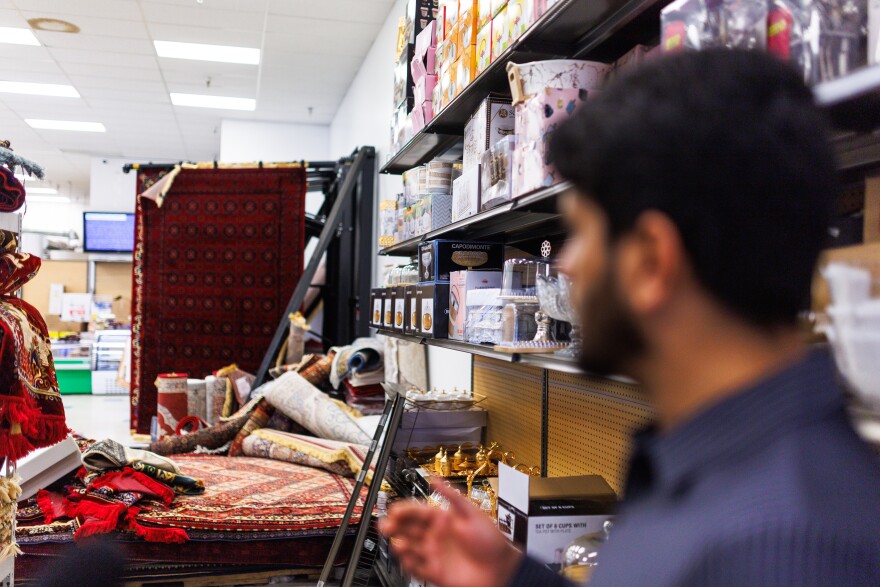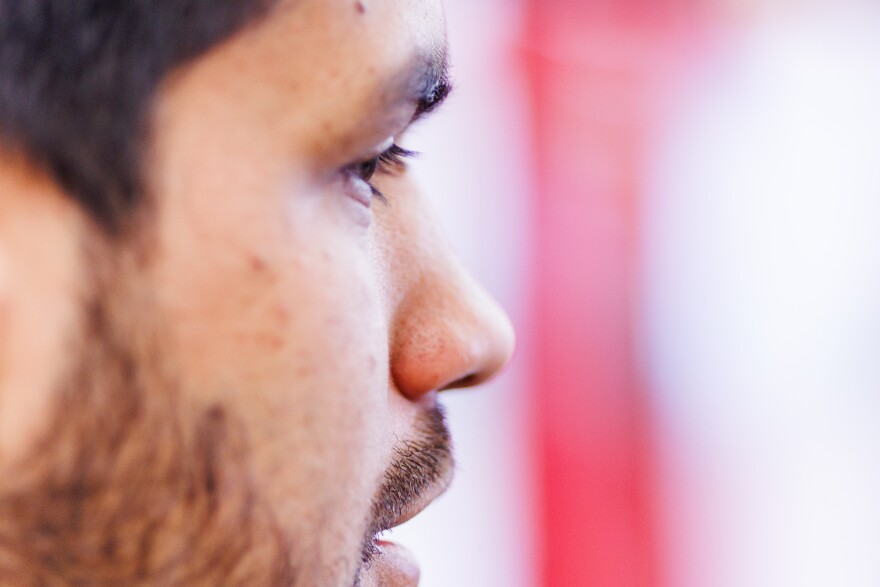After evacuating Afghanistan in 2021, Abdullah Zarify has made a life for himself in Richmond. He spends most of his time running his own market to support his wife and three children. He’s even made friends playing in a regional cricket league.
Refugees like Zarify find comfort in the stability and security absent in their native lands. But the pain of leaving home endures.
“I never wanted to come to the United States this way,” he said. “Suddenly, you leave everything and come to a country where you don’t know anyone.”
At the start of his new administration in January, President Donald Trump paused the government’s refugee resettlement program, freezing payments to resettlement agencies and halting travel plans for thousands of previously approved refugees.
But earlier this month, Trump admitted about five dozen white South Africans — largely descended from Dutch colonists whose heirs dominated government in the apartheid era — as refugees. In the same week, the US Department of Homeland Security terminated Temporary Protected Status for Afghan nationals who fled their country after the chaotic US withdrawal four years ago.
The shakeup of immigration policy has led to protests and allegations of racial discrimination. While Trump and his allies say they are saving victims of a “genocide” against white Afrikaner farmers, opponents say the federal government is misguided and ignoring vulnerable civilians and former allies in danger of persecution and violence.

Faith groups take issue
Bishop Sean Rowe of the Episcopal Church said the faith group’s refugee missions will not help new South African arrivals while the rest of the resettlement program remains frozen. "The idea that we would be somehow resettling Afrikaners at this point over other refugees who have been vetted and waiting in camps for months or even years, is unfathomable to us," Rowe told NPR’s Morning Edition earlier this month.
Other faith groups have also taken issue with the Trump administration’s approach to refugee resettlement.
The US Conference of Catholic Bishops in April chose to not renew a partnership with the US government, two months after it filed suit against the Trump administration for withholding funding for refugee settlement programs.
In Virginia, Commonwealth Catholic Charities laid off 26 staff members (about half of its refugee resettlement team) after federal officials said they would not reimburse costs the nonprofit incurred supporting approximately 350 government-vetted refugees who arrived in the last four months of 2024 — before Trump took office.
CCC typically provides direct aid for housing, food, language assistance, school enrollment, job search training and medical visits for the first three months. Afterward, the charity provides less intensive support for up to five years, at which point refugees can apply for US citizenship, said communications manager Katie Dillon
“Last time President Trump was in office, it was down to the lowest number of refugees allowed in the resettlement program’s history,” Dillon said. “We expected there would be some change. We didn’t expect that everything would just stop. That’s been really difficult. It’s a big part of what we do and who we are in our mission.”
According to HIAS, a Jewish immigration aid group, about 11,000 Afghans with Temporary Protected Status could be subject to deportation when the order takes effect on July 14.
The group described the administration’s reasons for ending TPS in Afghanistan as “unconvincing and misleading.”
When announcing the end of TPS for Afghanistan, Homeland Security Secretary Kristi Noem said conditions in the Middle Eastern nation have improved enough to lift the special designation.
“Afghanistan has had an improved security situation, and its stabilizing economy no longer prevent them from returning to their home country,” Noem said. “Additionally, the termination furthers the national interest as DHS records indicate that there are recipients who have been under investigation for fraud and threatening our public safety and national security.”
The World Bank last month reported that the nation’s economy shows signs of recovery but still faces “significant fiscal challenges.” And the Taliban, an internationally recognized terrorist organization, remains in power in Afghanistan. (Al-Jazeera last week reported that Secretary of State Marco Rubio is reconsidering the designation.)
International policy experts and Afghan expats say people still in the country who worked with or for the US or other Western nations face serious risk, including imprisonment and execution. Zarify still has several siblings and friends back in Afghanistan. Between them and stateside refugees at risk of being forced to return, he worries about what’s in store for his people.
“Right now, everything is just crazy,” he said, his voice mixing with the hum of refrigerators across from displays of Turkish and Afghan rugs in the back of Watan Market in Henrico County. “It’s not easy to come here and just enjoy it. You have to find work, learn the language and familiarize yourself with all these regulations and stuff. You have to fit yourself in this frame, and then, maybe two or three years later, you’re sent an email that says you have to go back there.”
”The meaning behind them is the time we spent there”
Zarify came to the US only when staying in Afghanistan no longer seemed viable. Years earlier, Zarify followed in his older brother’s footsteps by finishing college and getting a job with a US defense contractor. As highly educated locals who could speak English, they helped manage interpreters and vehicle rentals, along with other logistical needs.
His older brother decided to leave the country during a short visit to the US. “I was the one who actually replaced him,” Zarify said. During that trip, the brothers had a tense phone call after an explosion ripped through a hospital in Kabul.
That’s when discussions about leaving the country got more serious.

“Your life is not guaranteed,” Zarify said, describing the fear they contemplated. “Whenever you’re coming out of your home, maybe that’s your last goodbye to your family.”
Beyond the risk of collateral damage, they also worried about being targeted for their association with the American military.
Zarify stayed behind for a few more years. When the US evacuation started, it was time to go.
Within 48 hours of the Afghan government collapse on Aug. 15, 2021, Zarify hurried to the airport with his wife and his first son, born just 20 days earlier. “When we went to the airport,” he said, “it wasn’t just us.” He said a throng of around 1,000 people were clamoring to get past security and escape. After Zarify produced documents to get his family through, guards fired warning shots at the ground to deter the surging crowd. “It’s like you see in the movies,” Zarify said. “We saw it in real life.”
Their first days in the US weren’t easy. Commonwealth Catholic Charities helped them get on their feet, but the aid could not heal the trauma. He got out with his mom — but left two sisters behind. Depression took root.
“I cried every day for my country, for my friends, for my sisters, for my cousins, for my school — for everything,” he said. “All those [tears] … the meaning behind them is the time we spent there.”
Creating a new home
An executive order Trump signed in January 2025 says the US “lacks the ability to absorb large numbers of migrants, and in particular, refugees” without compromising the safety and security of Americans. It also asserts that the country can only accept people who can “fully and appropriately assimilate.”
And that’s what Zarify is trying to do, living in a pluralistic community with a well-established Middle Eastern diaspora. As he settled in Central Virginia with a special immigrant visa; he and his brother who had come years earlier started working together, selling imported hand-woven rugs out of their new home.
Eventually the business moved into a retail space on Broad Street. Today, Watan Market features a full-service halal deli and butcher counter. The store’s inventory includes authentic Middle Eastern and Afghan spices, snacks, drinks and kitchenware. Kettles and vacuum flasks (like Thermos) are among the most popular items.
“Most of our people are addicted to tea,” Zarify said. “They can’t live without tea.”
Zarify’s family has also grown with two more children born in the US. He said he spends many hours working at his store, but cherishes every moment with his daughter and two sons. He also misses the brotherhood of friends and foreign contractors he worked with in Afghanistan. But meeting others like him in the US to play cricket on the weekends makes him feel welcome.
Officials with CCC said refugees with special immigrant visas, like Zarify, are generally able to obtain permanent residency green cards and will not be impacted by the TPS order. Still, CCC added that those who first arrived in the US after the 2021 evacuation under the TPS will be expected to leave.
Already worried about the family and friends he left behind, the recent immigration policy changes have extended Zarify’s concern to refugees who will have fewer resources for support here — or face danger upon their return.



